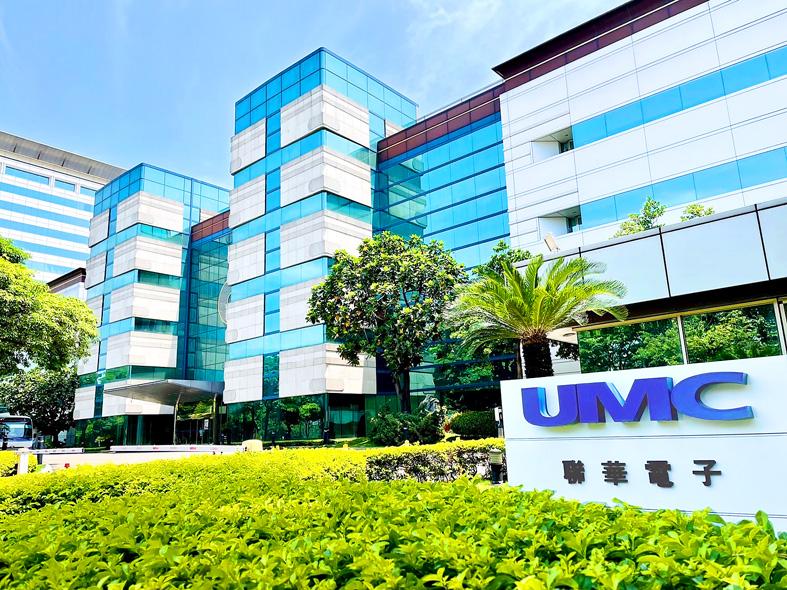United Microelectronics Corp (UMC, 聯電) yesterday declined to comment on a report that the White House had invited the nation’s second-largest contract chipmaker to build a semiconductor fab in Detroit.
UMC said it would not comment on market speculation, but said it had adopted a policy to diversify production and was continuing to assess the possibility of investments abroad.
A report published by the Chinese-language Economic Daily News said that UMC had been invited by the US government to build a 12-inch fab in Detroit.

Photo: Grace Hung, Taipei Times
Such an investment would follow similar moves by Taiwan Semiconductor Manufacturing Co (TSMC, 台積電) and South Korea’s Samsung Electronics Co. Their investments in the US were prompted by Washington amid a worldwide chip supply shortage, especially for automotive chips.
The report said that while TSMC and Samsung would focus on advanced technology development in their US operations, a UMC plant in Michigan would utilize mature 22-nanometer and 28-nanometer processes for automotive chips, which means the contract chipmaker would likely face limited competition from its bigger rivals.
TSMC last year announced it would invest US$12 billion to build a fab in Arizona, with mass production scheduled for the first quarter of 2024, while Samsung said it would invest US$17 billion in Texas, aiming to begin operations in the second half of 2024.
Citing industry sources, the Economic Daily News said that UMC would invest in Detroit, as it is home to the US’ three major automakers: General Motors Co, Ford Motor Co and Stellantis NV’s Chrysler.
The global auto industry has been struggling with a shortage of chips after automakers cut orders for semiconductors on forecasts that remote working and learning amid the COVID-19 pandemic would reduce vehicle sales, leading to inadequate supply once demand returned.
As many auto brands have entered the electric vehicle market, demand for chips used in the cars have also risen, which has exacerbated the shortage, the report said.
To assuage the effects of the chip shortage on the US auto industry, Washington wants UMC to build a fab in Detroit to serve automakers, as the chipmaker continued its efforts to develop semiconductors for automotive electronics, including those used in the advanced autonomous driving systems and “smart car cabins” and entertainment, the report said.
It is possible for UMC to invest NT$100 billion (US$3.51 billion) to set up a semiconductor plant in Detroit with a monthly production capacity of 15,000 to 20,000 units, it said.
UMC said only that the company has a global production plan, and its expansion would be included in its long-term development strategies.
UMC has plants in Taiwan, Singapore, Japan and China.
Last month, its board of directors approved a plan to build a new semiconductor fab in Singapore using 22-nanometer and 28-nanometer processes.
Under the Singapore expansion plan, an advanced manufacturing facility would be built next to its existing 12-inch plant, known as Fab12i, with the planned investment for the project to reach US$5 billion, UMC said.
In the first phase, the new fab would have a monthly capacity of 30,000 units, with production expected to start in late 2024, it added.

SELL-OFF: Investors expect tariff-driven volatility as the local boarse reopens today, while analysts say government support and solid fundamentals would steady sentiment Local investors are bracing for a sharp market downturn today as the nation’s financial markets resume trading following a two-day closure for national holidays before the weekend, with sentiment rattled by US President Donald Trump’s sweeping tariff announcement. Trump’s unveiling of new “reciprocal tariffs” on Wednesday triggered a sell-off in global markets, with the FTSE Taiwan Index Futures — a benchmark for Taiwanese equities traded in Singapore — tumbling 9.2 percent over the past two sessions. Meanwhile, the American depositary receipts (ADRs) of Taiwan Semiconductor Manufacturing Co (TSMC, 台積電), the most heavily weighted stock on the TAIEX, plunged 13.8 percent in

A wave of stop-loss selling and panic selling hit Taiwan's stock market at its opening today, with the weighted index plunging 2,086 points — a drop of more than 9.7 percent — marking the largest intraday point and percentage loss on record. The index bottomed out at 19,212.02, while futures were locked limit-down, with more than 1,000 stocks hitting their daily drop limit. Three heavyweight stocks — Taiwan Semiconductor Manufacturing Co (TSMC, 台積電), Hon Hai Precision Industry Co (Foxconn, 鴻海精密) and MediaTek (聯發科) — hit their limit-down prices as soon as the market opened, falling to NT$848 (US$25.54), NT$138.5 and NT$1,295 respectively. TSMC's

TARIFFS: The global ‘panic atmosphere remains strong,’ and foreign investors have continued to sell their holdings since the start of the year, the Ministry of Finance said The government yesterday authorized the activation of its NT$500 billion (US$15.15 billion) National Stabilization Fund (NSF) to prop up the local stock market after two days of sharp falls in reaction to US President Donald Trump’s new import tariffs. The Ministry of Finance said in a statement after the market close that the steering committee of the fund had been given the go-ahead to intervene in the market to bolster Taiwanese shares in a time of crisis. The fund has been authorized to use its assets “to carry out market stabilization tasks as appropriate to maintain the stability of Taiwan’s

In a small town in Paraguay, a showdown is brewing between traditional producers of yerba mate, a bitter herbal tea popular across South America, and miners of a shinier treasure: gold. A rush for the precious metal is pitting mate growers and indigenous groups against the expanding operations of small-scale miners who, until recently, were their neighbors, not nemeses. “They [the miners] have destroyed everything... The canals, springs, swamps,” said Vidal Britez, president of the Yerba Mate Producers’ Association of the town of Paso Yobai, about 210km east of capital Asuncion. “You can see the pollution from the dead fish.